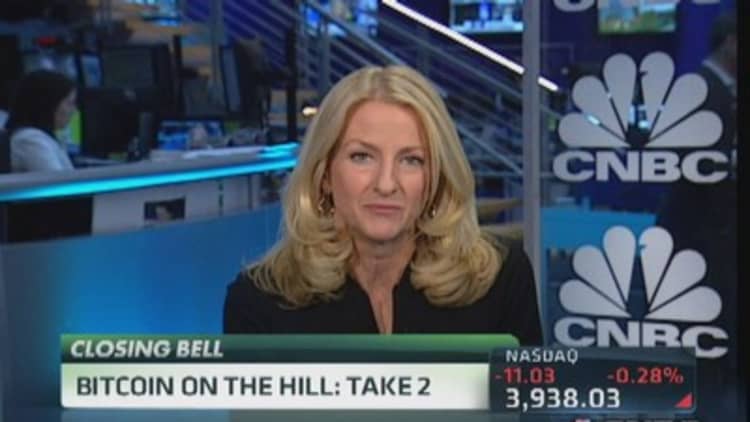Two U.S. Senate Committees this week helped publicize the economic benefits of virtual currencies, but America may have already missed the boat and failed to gain dominance in this burgeoning industry.
Lawmakers heard extensive evidence this week of the merits of bitcoin and its peers, which are decentralized virtual currencies that allow users to exchange online credits for goods and services. Anthony Gallippi, the founder of U.S-based bitcoin payment processor BitPay believes the U.S. must embrace this new technology.
"The businesses who accept bitcoin are now opening up new markets, and creating more exports, and more jobs in America. If the United States doesn't allow our businesses to accept bitcoin and create more jobs and exports, then countries like Germany and China certainly will," he said at his testimony in front of the Committee on Banking, Housing and Urban Affairs on Tuesday.
(Slideshow: Who needs bitcoin? Check out these virtual currency alternatives)
"If we look 10-20 years in the future, we will see many companies built upon bitcoin related technology. We want those companies to be based in America, creating jobs in America, and building a revenue base and tax base in America."
Gallippi added that bitcoin was a cheaper, faster, and more secure payment system than credit cards. He said it could help combat the identity fraud that last year claimed over 12 million victims, citing a Javelin Strategy and Research Report from February. Gallippi also stated it would nullify the threat of payment fraud, which cost businesses over $20 billion per year, citing a September report by LexisNexis which provides legal research services.
Favorable comments from bitcoin enthusiasts like Gallippi may have been expected, but even the more objective panelists were upbeat on the potential of virtual currencies, despite concerns over vulnerabilities and their connection with money laundering.
Paul Smocer, president at BITS, the technology policy division of industry body The Financial Services Roundtable, said that digital currencies appeal to merchants and customers due to lower transaction costs. Their ability to facilitate simpler international funds transfers would also mean companies would see an increase in international sales opportunities, he said at Tuesday's hearing.
(Read More: As bitcoin skyrockets, is a bubble at hand?)
Giving the example of publishing tool Wordpress, he added that virtual currency acceptance has allowed it to access new consumers in countries where traditional payment systems do not permit access.
The price of bitcoin skyrocketed to the $900 level on Monday as regulators provided their views but there is no disguising that America is now playing catch up.
Back in August, the German Finance Ministry recognized bitcoin as a "unit of account", meaning it can be used for tax and trading purposes in the country. BTC China is now the world's biggest bitcoin exchange, according to Bitcoinity.org, with more than 480,000 bitcoins having been exchanged on the site in the past seven days - 30 percent of the market share.

The Chinese exchange is now believed to have the highest number of registered users and received $5 million in funding this week from institutional investors Lightspeed China Partners and Lightspeed Venture Partners. Other major exchanges are located in Japan and in Eastern Europe.
Jon Matonis, the executive director of the Bitcoin Foundation and notable commentator on the cryptocurrency says that Atlanta-based Camp BX is the only functioning exchange in the U.S., and volumes are diminishing.
(Read More: Bitcoin hits $750, up 107% in a week)
"During the first three-and-a-half years of bitcoin's development from 2009 to 2012, a large portion of that technological experimentation had been occurring in the U.S. with multiple bitcoin trading exchanges and bitcoin-related businesses," he wrote in an editorial on Saturday for industry blog CoinDesk.
"A free and robust bitcoin economy drives growth and jobs, provides relief for the unbanked, and facilitates global financial inclusion," he said.
He added that the labyrinth and ambiguity of state-by-state compliance issues means financial institutions find it easier to ignore bitcoin-related opportunities. The U.S. jurisdiction must strategically evaluate a path going forward, he said, and any delay would serve only to increase the clout and power of the other jurisdictions competing for this lucrative business.
"I am encouraged by some of the commentary from regulatory officials participating in the Senate hearings, however the proof will be if actual steps are taken towards making the U.S. a more appealing jurisdiction for bitcoin-related companies and exchanges," he told CNBC via email.
"Currently, there is a 'chilling effect' cast over banks that do any business with bitcoin-related companies. The ball is now in the government's court to correct that."
By CNBC.com's Matt Clinch. Follow him on Twitter @mattclinch81


